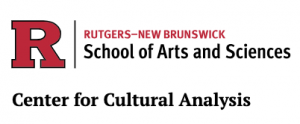CCA Postdoctoral Associates at Rutgers
Theme for 2025-26: Hunger

Typically the Center for Cultural Analysis will sponsor five fellowships for Rutgers faculty, five fellowships for Rutgers graduate students, and two Postdoctoral Associate positions for external scholars. All seminar participants will have access to the CCA’s resources and will be expected to participate in and to present their work during CCA seminars, which meet regularly throughout the academic year.
Theme for 2025-26: Hunger
Co-organizers: Carla Cevasco and Jack Bouchard
How do we study that which is missing?
The 2025-26 Seminar at the Center for Cultural Analysis grapples with this question by interrogating hunger in the past and present. Food studies scholarship has a rich literature on culinary practices, commodities, food production, and the cultural representation of food. Far more meager are studies that contend with the absence of food at the individual or collective level. Scholars now recognize that hunger is a product of cultural understanding, changing across place and time, such that victims of famine, for example, might still hesitate to eat food that falls outside their cultural proscriptions. Hunger is at once a very personal experience, a biological imperative felt in the body, and a collective struggle felt by whole communities. In the face of such complexities, the study of hunger has often been left to doctors and scientists rather than humanists. In the words of the historians Sara Millman and Robert W. Kates, “the history of hunger is for the most part unwritten. The hungry rarely write history, and historians are rarely hungry.”
Hunger is an urgent political and humanitarian challenge around the globe, and the academy can no longer afford to ignore these spaces of absence. In the twenty-first century, hunger is an outcome of climate change and natural disaster, war and genocide, poverty, inequality, and protest (as in hunger strikes). It is an everyday reality for communities like Rutgers-New Brunswick, where 1 in 3 undergraduate or graduate students is food insecure, and the broader New Brunswick community, where 1 in 3 people live below the poverty line. Hunger is also a global historical phenomenon, with a rich interdisciplinary scholarship that must be brought to bear on our contemporary crisis. We may see in the past not just the trauma of hunger as expressed by survivors, poets, artists, and critics, but also the deliberate use of hunger by political and economic powers to control others. By its nature hunger is interdisciplinary, caused by the convergence of historical, social, economic, political, cultural, and other changes. The gnawing pangs of hunger echo across the centuries, and we may find parallels, causes, and potential solutions as we cast a wide net in studying hunger as a persistent feature of the human experience.
Led by two food studies scholars, Jack Bouchard (History) and Carla Cevasco (American Studies), the 2025-6 CCA Interdisciplinary Research Seminar will consider hunger from all of these angles, and more, potentially drawing participants from the humanities (history, literature, etc.), social sciences (anthropology, sociology, etc.), SEBS (including Food Science, Expanded Food and Nutrition Education Program, Rutgers Against Hunger initiative, and Family and Community Health Services), and RBHS. In addition to the discussion of traditional scholarship, we will use the seminar as an opportunity for community-engaged scholarship and field visits, with potential partners including the Native American garden project at Rutgers Gardens, Rutgers Against Hunger, co-LAB Arts, Elijah’s Promise, and other on- and off-campus entities. Over the course of the year, we aim to investigate hunger in the past and the present, and to give a new generation of food studies scholars an opportunity to pursue and discuss their own research.
FACULTY FELLOWSHIPS
Faculty members may apply for a fellowship in connection with the annual theme. The CCA will grant up to five faculty fellowships awarded in connection with the seminar, in the form of a course-release in either the Fall or Spring semester (course-releases are supported by funding for instructional replacement arranged through the Fellow’s department and paid by CCA, generally at the amount of $5000). Faculty who will hold other fellowships (NEH, Guggenheim, sabbatical, etc.) are not eligible to receive funded fellowships from the CCA, but faculty who will be on fellowship or sabbatical may apply to be appointed as unfunded fellows. Applications from regular, full-time faculty members should be submitted for approval to their department chairs, who will in turn forward completed applications to the CCA. Department chairs must indicate their willingness to accept the terms of support for a course release. Chairs may support more than one application.
CCA 2024-2025 Faculty Fellowship Application
Completed applications for Faculty Fellows must be submitted by Wednesday, January 15, 2025 at 8PM.
GRADUATE FELLOWSHIPS
Five graduate student fellowships will be awarded by the CCA to students who are in the process of writing their dissertations (i.e. coursework has been completed). Graduate Fellowships grant $25,000 and tuition remission for up to 3 research credits per semester for the year. Graduate Fellows will be expected to attend all events related to the main seminar and to participate actively in the public functions of the CCA. Graduate Fellows may not hold any other teaching positions, long-term fellowships, or administrative appointments during their CCA year. However, students who will hold other year-long fellowships may apply to be appointed as unfunded Fellows, provided their application clearly indicates the relevance of the seminar topic to their dissertation work. Graduate Fellowships will ordinarily be awarded only to students who have received 5 or fewer years of funding from Rutgers University at the time of application. Students who have already received 6 or more years of support may apply if the seminar theme is particularly suited to their dissertation projects, but they will require a waiver from SAS to take up the CCA Fellowship.
Fellows will have access to the resources of the CCA and staff support, within the limits allowable by the CCA’s budget.
CCA 2024-2025 Graduate Fellowship Application
Completed applications for Graduate Fellows must be submitted by Wednesday, January 15, 2025 at 8PM.
Graduate Fellow applications require two letters of recommendation, emailed as PDF files directly from the recommender to the CCA: admin@cca.rutgers.edu. Letters of recommendation must be received by Wednesday, January 22, 2025.
POSTDOCTORAL ASSOCIATES
The Center for Cultural Analysis at Rutgers University-New Brunswick seeks to appoint two external Postdoctoral Associates for a one-year-long residential fellowship during academic year 2025-26. Successful candidates may come from any relevant discipline. All requirements for the PhD or other terminal degree in the relevant field must be completed by August 1, 2025. A record of publication and scholarly engagement relevant to the seminar’s topic is required. Postdoctoral Associates will attend a bi-monthly research seminar, present their own work, and organize a symposium. CCA Postdoctoral Associates receive a salary of $60,000, health benefits, a private office, and administrative support. Fellows normally teach 1 undergraduate course each fellowship year. Since the CCA Postdoctoral Associate position is considered a residential appointment, candidates must agree to establish residency within a forty-mile radius of the New Brunswick campus during the academic year.
Submissions should include a cover letter, CV, and a research statement (no more than 2 single-spaced pages). Finalists will be requested to submit a writing sample (article or chapter length), description of an undergraduate course you would like to teach (no more than 1 single-spaced page), and three confidential letters of recommendation (These must be uploaded by your referees.).
Application for Postdoctoral Position.
Please direct all inquiries about this search to admin@cca.rutgers.edu.
